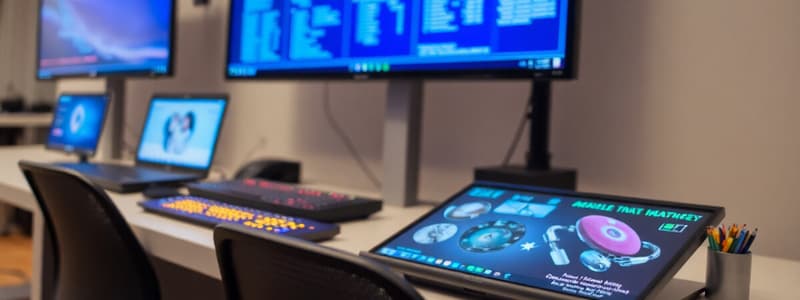Podcast
Questions and Answers
Who stated that ICT includes computer hardware, software, telecommunications, networks, digital cameras, games, CDs, DVDs, cell phones, satellites and fiber optics?
Who stated that ICT includes computer hardware, software, telecommunications, networks, digital cameras, games, CDs, DVDs, cell phones, satellites and fiber optics?
- Haddad (2003)
- Wang (2008)
- Moursund (2005)
- Tinio (2009) (correct)
According to whom is ICT a diverse set of technological tools and resources used to communicate, create, disseminate, store, and manage information, including hardware devices, software applications, internet connectivity, broadcasting technologies, and telephones?
According to whom is ICT a diverse set of technological tools and resources used to communicate, create, disseminate, store, and manage information, including hardware devices, software applications, internet connectivity, broadcasting technologies, and telephones?
- Tinio (2009)
- UNESCO (2020) (correct)
- Ratheeswari (2018)
- Laurillard (2002)
Who described ICT as a scientific, technological, and engineering discipline and management technique?
Who described ICT as a scientific, technological, and engineering discipline and management technique?
- UNESCO (2020)
- Tinio (2009)
- Haddad (2003) (correct)
- Wang (2008)
According to whom does ICT influence workplaces, business, education, and entertainment?
According to whom does ICT influence workplaces, business, education, and entertainment?
Which framework captures iterative, communicative, adaptive, reflective, and goal-oriented actions to support learning?
Which framework captures iterative, communicative, adaptive, reflective, and goal-oriented actions to support learning?
Which of the following are key teaching and learning events?
Which of the following are key teaching and learning events?
What are the three fundamental elements of ICT integration?
What are the three fundamental elements of ICT integration?
What does ICT support the development of?
What does ICT support the development of?
According to UNESCO (2018), what is the aim of the ICT Competence Framework for Teachers?
According to UNESCO (2018), what is the aim of the ICT Competence Framework for Teachers?
According to UNESCO (2020), when is ICT integration considered effective?
According to UNESCO (2020), when is ICT integration considered effective?
According to Ratheeswari (2018), what is ICT integration more than?
According to Ratheeswari (2018), what is ICT integration more than?
According to Laurillard (2002), which of the following is a key element of ICT-enhanced teaching and learning?
According to Laurillard (2002), which of the following is a key element of ICT-enhanced teaching and learning?
According to UNESCO (2020), how should ICT be integrated in the classroom?
According to UNESCO (2020), how should ICT be integrated in the classroom?
According to Haddad (2003), what is suggested by the research on ICT integration?
According to Haddad (2003), what is suggested by the research on ICT integration?
According to Ratheeswari (2018), what opportunities does ICT provide for students?
According to Ratheeswari (2018), what opportunities does ICT provide for students?
According to Haddad (2003), what does ICT enable teachers to develop?
According to Haddad (2003), what does ICT enable teachers to develop?
According to Wang (2008), what is most important for effective ICT integration?
According to Wang (2008), what is most important for effective ICT integration?
According to Ratheeswari (2018), what does ICT act as?
According to Ratheeswari (2018), what does ICT act as?
According to UNESCO (2018), what goal is linked to using ICT in instruction?
According to UNESCO (2018), what goal is linked to using ICT in instruction?
According to Moursund (2005), what does ICT include?
According to Moursund (2005), what does ICT include?
According to Tinio (2009), ICT can be described as:
According to Tinio (2009), ICT can be described as:
According to UNESCO (2020), ICT is a discipline about:
According to UNESCO (2020), ICT is a discipline about:
According to Ratheeswari (2018), ICT influences:
According to Ratheeswari (2018), ICT influences:
Flashcards
ICT Definition
ICT Definition
Includes computer hardware, software, telecommunications, networks, digital cameras, games, CDs, DVDs, cell phones, satellites, and fiber optics.
ICT as a Toolset
ICT as a Toolset
A diverse set of tools used to communicate, create, disseminate, store, and manage information, including hardware, software, internet, broadcasting, and telephones.
ICT as a Discipline
ICT as a Discipline
A scientific, technological, and engineering discipline focused on handling information and its impact on society.
ICT's Impact
ICT's Impact
Signup and view all the flashcards
Conversational Framework
Conversational Framework
Signup and view all the flashcards
Key Learning Events
Key Learning Events
Signup and view all the flashcards
ICT Integration Elements
ICT Integration Elements
Signup and view all the flashcards
ICT Benefits
ICT Benefits
Signup and view all the flashcards
What does ICT include?
What does ICT include?
Signup and view all the flashcards
How can ICT be described?
How can ICT be described?
Signup and view all the flashcards
What is ICT as a discipline?
What is ICT as a discipline?
Signup and view all the flashcards
How does ICT influence life?
How does ICT influence life?
Signup and view all the flashcards
Fundamental ICT elements
Fundamental ICT elements
Signup and view all the flashcards
How ICT supports skills
How ICT supports skills
Signup and view all the flashcards
Framework goal
Framework goal
Signup and view all the flashcards
Teacher framework aims
Teacher framework aims
Signup and view all the flashcards
Effective integration
Effective integration
Signup and view all the flashcards
ICT Integration
ICT Integration
Signup and view all the flashcards
Key elements
Key elements
Signup and view all the flashcards
Accessibility
Accessibility
Signup and view all the flashcards
Importance in class
Importance in class
Signup and view all the flashcards
Study Notes
- ICT includes computer hardware, software, telecommunications, networks, digital cameras, games, CDs, DVDs, cell phones, satellites, and fiber optics (Moursund, 2005).
- ICT is a diverse set of tools and resources employed to communicate, create, disseminate, store, and manage information (Tinio, 2009).
- These technologies encompass hardware devices, software applications, internet connectivity, broadcasting technologies, and telephones (Tinio, 2009).
- ICT is a scientific, technological, and engineering discipline and management technique related to information handling and its impact on social, economic, and cultural matters (UNESCO, 2020).
- ICT influences workplaces, business, education, and entertainment, acting as a catalyst for change in various aspects of human life (Ratheeswari, 2018).
- The Conversational Framework captures iterative, communicative, adaptive, reflective, and goal-oriented actions with feedback for complete learning (Laurillard, 2002).
- The five key teaching and learning events are acquisition, discovery, dialogue, practice, and creation (Laurillard, 2002).
- The three fundamental elements of ICT integration are pedagogy, social interaction, and technology (Wang, 2008).
- ICT supports the development of higher-order-thinking skills (HOTS) and promotes collaboration (Haddad, 2003).
- The ICT Competence Framework for Teachers promotes educational reform and sustainable economic development based on global educational goals (UNESCO, 2018).
- The ICT Competence Framework for Teachers equips teachers to build workforces with ICT skills and encourages societal participation (UNESCO, 2018).
- Effective ICT integration occurs when students select technology tools to obtain information, analyze data, and present it personally (UNESCO, 2020).
- ICT integration requires teachers to structure learning tasks so that ICT use becomes a natural response to learning needs, rather than focusing solely on mastering hardware and software skills (Ratheeswari, 2018).
- The five key elements of ICT-enhanced teaching and learning are acquisition, discovery, dialogue, practice, and creation (Laurillard, 2002).
- ICT should be integrated into the classroom to be as accessible as traditional tools like markers and whiteboards (UNESCO, 2020).
- Research indicates that ICT integration can transform classroom instruction (Haddad, 2003).
- ICT is important in the classroom as it provides students opportunities to learn and apply 21st-century skills, improving teaching and learning (Ratheeswari, 2018).
- ICT enables teachers to develop students' higher-order thinking skills (HOTS) and promote collaboration in the learning environment (Haddad, 2003).
- Effective ICT integration emphasizes pedagogical and technological considerations, with a strong emphasis on pedagogy (Wang, 2008).
- ICT acts as a catalyst for change, influencing working conditions, teaching methods, learning approaches, and information exchange (Ratheeswari, 2018).
- The use of ICT in instruction has been linked to achieving societal goals such as fostering tolerance, problem-solving, and knowledge generation (UNESCO, 2018).
Studying That Suits You
Use AI to generate personalized quizzes and flashcards to suit your learning preferences.




